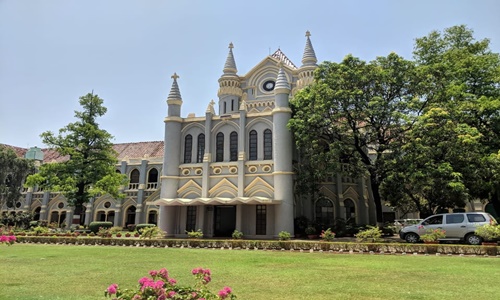Vanshika Tewari
Case: SUMIT PARASHAR V/S STATE OF M.P. & OTHS.
A writ petition was filed by the students of the Dharmashastra National Law University seeking relief in form of re-examination and the petitioners being able to attend the remedial classes with no further default fee being charged apart from the nominal examination fee.
In the wake of the Covid-19 pandemic, the respondent university i.e; DNLU was functioning in virtual mode for almost two years.’ – The petitioner contended.
The university went on to take classes in the hybrid mode once the pandemic eased out but it was on 8/5/22 that the college notified its students of the commencement of the compulsory offline classes from 11/5/22. It was during this time that various students had taken medical & academic leaves. The college had agreed upon considering such absence and the attendance for the same was to be granted to the students.
The university through its controller of examination circulated an email comprising the list of students who due to their medical record were to be permitted to sit for the end-term examination and also stated that ‘ The student who will not be permitted for giving their end term exams of any concerned subject will be notified in the due time.’
Date in another email the university via its exam controller notified that it would not accept medical leaves for the students whose attendance was below 65%.
Why The Petition?
The ambiguity arose when the students got to know that apart from what was stated in the last email the university had already considered some medical leave cases while the others were left with no knowledge of what is to be done. This recognition and in-recognition of the leave applications were the main reason that caused a stir.
The university commenced with its end-term exams and up until then, no information regarding the list of debarred students was released. The students were pulled out of the examination hall and were restricted from writing the papers any further.
An option of paying an amount of ₹ 7500 per subject (As a re-examination fee) and then re-appearing for the exams was provided to the debarred students.
As a result, the students went on to fill out the petition claiming that such a step was taken by the university just to fill its pockets. It was by doing this the university refrained from accepting the fact that it was due to the university’s incapacity to meet the minimum number of classes required to be completed for the Legal course i.e; 432 hours (As laid down in the BCI Guidelines) the university went onto completing 273 hours only, this in a way contributed to the less attendance percentage of the students is due to the deficiency in hours the weightage for each class increased.
What Relief Is to Be Granted?
The petition claims that such actions by the university are arbitrary and violative of Article 14 of the Indian Constitution.
The Hon’ble Supreme Court’s statement in the case of –
Cochin University of Science & Technology v. Thomas P. John, (2008) 8 SCC 82, T.M.A. Pai Foundation v. State of Karnataka, (2002) 8 SCC 481 and Islamic Academy of Education v. State of Karnataka, (2003) 6 SCC 697:
“The broad principle is that an educational institution must be left to its own devices in the matter of fixation of fee, though profiteering or imposition of capitation fee is to be ruled out, and that some amount towards surplus funds available to an institution must be permitted and visualized, but if broad principles concerning fixation of the fee are adopted, an educational institution cannot be called upon to explain the details of its receipts and expenses. From this, however, it should not be understood that the educational institution has a carte blanche to fix any fee that it likes but substantial autonomy must be left to it.”
This statement along with other similar judgments has been added as a referral for the bench by the petitioner to strengthen their stand.
It is in the light of these judgements that –
The Petitioner in his prayer has requested the Hon’ble High Court, under the writ of Mandamus to order Respondent No. 2 (DNLU) to not charge the re-examination amount of ₹7500 per subject and settle for the nominal examination fee that is to be paid per semester. Further, an order for letting the students appear for the end-term examination and attend the remedial classes without paying any additional amount was also requested.
Current Status
The petition is pending before the Hon’ble High Court of Madhya Pradesh (Jabalpur Bench) and a ‘Counter -affidavit’ from the side of the Respondents is awaited.

